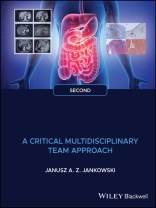GASTROINTESTINAL ONCOLOGY
Blends quality research findings with advanced educational techniques in a uniquely comprehensive approach
Written and edited by leading international experts in the field, Gastrointestinal Oncology: A Critical Multidisciplinary Team Approach is an indispensable reference for clinicians, medical practitioners, and trainees involved in the investigation, diagnosis, and treatment of esophageal, gastric, intestinal, colonic, hepatobiliary, pancreatic, and other gastrointestinal tumors. Drawing on the most current evidence-based knowledge, this comprehensive resource reflects the current care of GI cancer patients, enabling effective clinical decision making and patient management.
Setting the standard in clinical practice, Gastrointestinal Oncology remains the only truly multidisciplinary reference designed for the diverse team of clinicians responsible for different stages of cancer treatment. Specially structured clinical chapters, each representing a different role in the multidisciplinary team (MDT), allow clear presentation and quick reference of the contents. This is supported by a wealth of high-quality color photographs, line drawings, and diagrams.
Now in its second edition, this authoritative reference is fully updated to reflect groundbreaking research in multiple medical fields, including the explorative use of A.I. New sections on palliative care and nutrition are accompanied by new sub-sections on molecular characterization, new targeted small molecule, receptor options, and immunological therapies for each cancer. This edition places renewed emphasis on the most ubiquitous conditions, such as colon cancer, liver cancer, and gastro-esophageal cancer.
Covering the oncology of the entire gastrointestinal tract, Gastrointestinal Oncology: A Critical Multidisciplinary Team Approach is a must-have reference for the entire MDT, including gastroenterologists, hepatologists, GI surgeons, medical oncologists, radiation therapists, interventional radiologists, pathologists, nutritionists, palliative care and specialist nurses, as well as clinical scientists.
Tabela de Conteúdo
List of Contributors , vii
Preface , xvii
Foreword , xviii
Section I: Upper Gastrointestinal Cancer, 1
1 Epidemiology, Microbiome, and Risk Factors Involved in Carcinogenesis of Esophagus, Gastric, and Intestine, 3
2 Genomics, Molecular Pathology, and Pathology of Esophageal and Gastric Cancer, 23
3 Screening, Surveillance, and Prevention of Esophageal and Gastric Cancers, 42
4 Management of Esophageal Dysplasia and Esophageal Adenocarcinoma, 63
5 Esophageal Squamous Cell Carcinoma, 82
6 Management of Diffuse Gastric Cancer, 116
7 Intestinal-type Gastric Cancer, 120
8 Cancer of the Small Intestine, 139
Section II: Colorectal and Anal Cancer, 145
9 Epidemiology, Microbiome, and Risk Factors Involved in Carcinogenesis of Colorectal Cancer, 147
10 Genomics, Histopathology, and Molecular Pathology of Sporadic and Hereditary Colorectal Cancer, 149
11 Screening, Surveillance, and Prevention for Colorectal Cancer, 170
12 Colorectal Cancer, 181
13 Epidemiology, Pathology, Diagnosis, Prevention, and Management of Anal Cancer, 235
Section III: Hepatobiliary and Pancreas Cancer, 249
14 Epidemiology and Risk Factors of Hepatocellular Carcinoma, 251
15 Pathology, Molecular Pathology, and Genomics of Hepatobiliary and Pancreatic Cancer, 264
16 Screening, Surveillance, and Prevention of Hepatocellular Carcinoma, 271
17 Pancreatic and Biliary Tract Cancers: Risk Factors and Etiology, Screening, Surveillance, and Biomarkers of Detection and Prognosis, 291
18 The Multidisciplinary Management of Primary Hepatocellular Carcinoma, 321
19 Management of Metastatic Liver Cancer, 347
20 Management of Primary Pancreatic Cancer, 386
21 Management of Intrahepatic and Extrahepatic Cholangiocarcinoma, 407
22 Management of Cystic Neoplasms of the Pancreas, 438
Section IV: Specialist Abdominal Cancer Management teams, 455
23 Epidemiology, Pathology, Diagnosis, Prevention, and Management of GI Stromal Tumors and Other GI Sarcomas, 457
24 Neuroendocrine Neoplasms of the Digestive System, 470
25 Epidemiology, Pathology, Diagnosis, Prevention, and Management of Unknown Primary Cancer, 538
26 Diagnosis and Management of Gastrointestinal Lymphomas, 546
27 Palliative and Supportive Medicine in Gastrointestinal Oncology, 561
28 Psychological Oncology and Wellbeing: Wellbeing (part 1) and narrative practices in child palliative care (part 2), 576
29 Nutrition for Cancer Prevention, Adjunctive Cancer Care, and Rehabilitation: Nutrition and Cancer, 587
Cancer – The Road Less Traveled, 591
Index, 593
Sobre o autor
Janusz A. Z. Jankowski, MB Ch B, MSc, MD, Ph D, AGAF, FRCP, FRCPE, FACG, SFHEA, PGCC, PGCE, PGCM, JP, is a doctor, educator, scientist, executive coach, and policy expert who has held numerous clinical, educational, research and administrative roles, including as Provost/Dean in the United Arab Emirates, Associate Dean at the Peninsula Medical School, UK, and the Sir James Black Senior Fellow and Honorary Professor at the University of Oxford, UK. He has also served as the Chair of Education for the British Society of Gastroenterology as well as a Regional Director of Postgraduate Training in Medical Education in England. He also serves as a Consultant Physician, Gastroenterologist, Lead Mentor and Non-Executive Director for the National Health Service, UK as well as being an Honorary Clinical Professor at University College London. In addition, he has been a government clinical advisor to both the National Institute for Health and Care Excellence (NICE), UK, and overseas healthcare organisations as well as serving on Family Law and Medical Panels.












